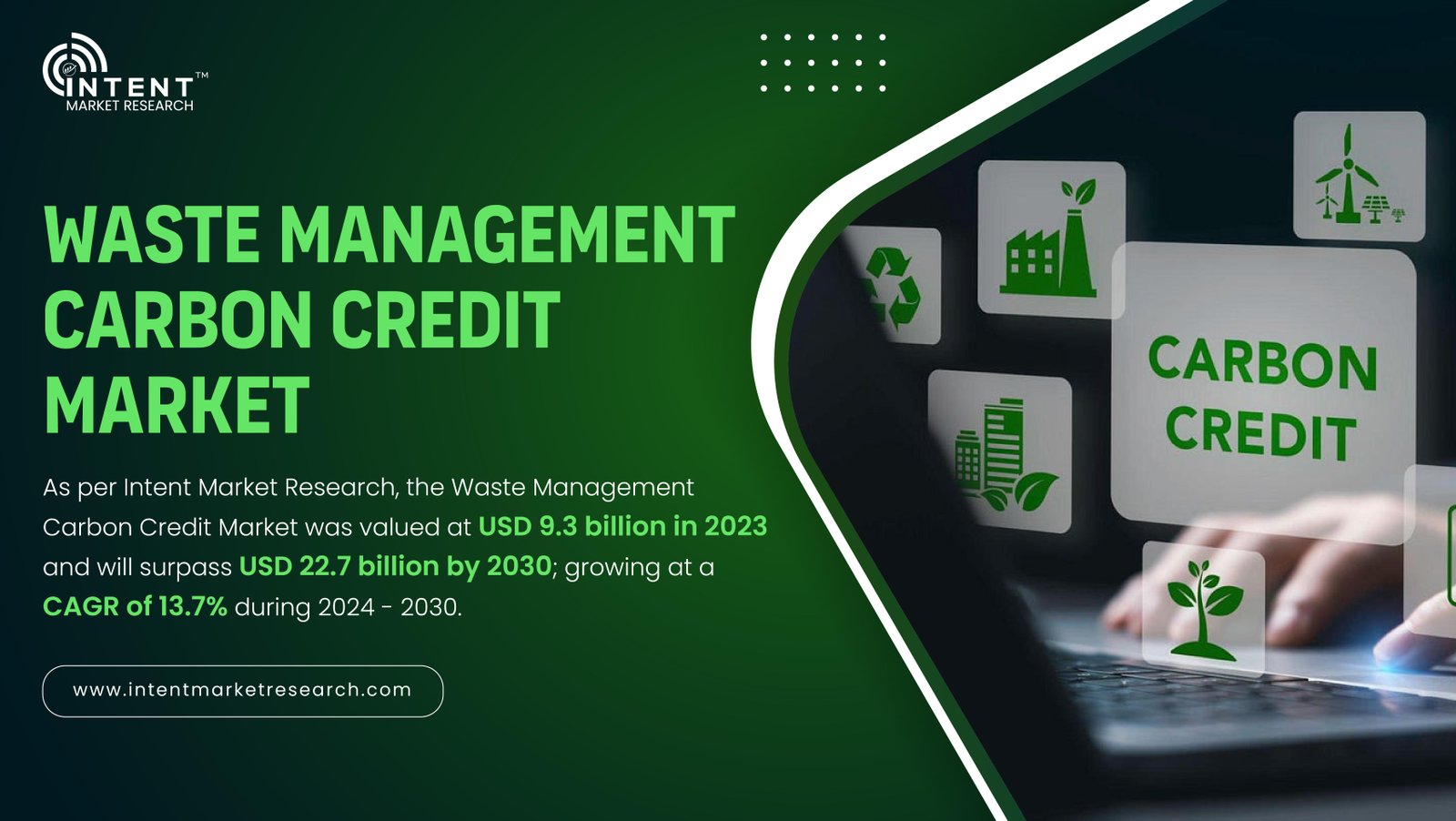Waste Management Carbon Credit Market: A Sustainable Approach to Climate Action
The Waste Management Carbon Credit Market has become a crucial element in combating climate change by incentivizing waste reduction and carbon mitigation efforts. According to Intent Market Research, the market was valued at USD 9.3 billion in 2023 and is projected to surpass USD 22.7 billion by 2030, growing at a CAGR of 13.7% from 2024 to 2030. This article explores the dynamics, drivers, and future potential of this rapidly evolving market.
Understanding Waste Management Carbon Credits
A carbon credit represents the reduction or removal of one metric ton of carbon dioxide (CO₂) or its equivalent greenhouse gases. Waste management companies can earn carbon credits by adopting sustainable practices such as recycling, composting, and methane capture. These credits can then be sold to organizations seeking to offset their emissions.
Get Access to Free Sample Research Report with Latest Industry Insights @ https://intentmarketresearch.com/request-sample/waste-management-carbon-credit-market-5062.html
Key Drivers of Market Growth
1. Increasing Regulatory Pressure
Governments worldwide are introducing stringent regulations to reduce carbon emissions, encouraging companies to participate in carbon credit markets.
2. Rising Awareness of Climate Change
As the effects of global warming become more evident, businesses and individuals are prioritizing sustainability and carbon neutrality.
3. Growth in Waste Generation
With urbanization and population growth, waste production is increasing, creating both challenges and opportunities for sustainable waste management practices.
4. Corporate Sustainability Goals
More companies are committing to net-zero emissions targets, driving demand for carbon credits derived from waste management projects.
5. Technological Advancements
Innovations in waste management, such as advanced recycling technologies and waste-to-energy systems, are making it easier to generate carbon credits.
Market Segmentation
By Project Type
- Landfill Gas Recovery
- Captures methane emissions from landfills and converts them into energy.
- Composting Projects
- Reduces methane emissions by converting organic waste into compost.
- Recycling Initiatives
- Reduces the need for virgin materials, lowering emissions.
- Waste-to-Energy
- Converts waste into renewable energy sources like electricity or biofuels.
By Credit Type
- Voluntary Carbon Credits
- Purchased by companies to offset their emissions as part of voluntary sustainability initiatives.
- Compliance Carbon Credits
- Required by governments or regulatory bodies under cap-and-trade programs.
By End-User
- Corporate Sector
- Companies in manufacturing, energy, and technology sectors are key buyers of carbon credits.
- Municipal Authorities
- Cities investing in sustainable waste management practices.
- Non-Profit Organizations
- Engaged in environmental conservation and climate advocacy.
By Region
- North America
- A leading region due to robust regulatory frameworks and corporate sustainability efforts.
- Europe
- Strong participation in the EU Emissions Trading System (EU ETS) drives market growth.
- Asia-Pacific
- Rapid industrialization and waste generation make it a critical region for market expansion.
- Latin America and Africa
- Emerging markets with significant potential for waste management and carbon credit generation.
Browse Complete Summary, Tables and Figures of the Report @ https://intentmarketresearch.com/latest-reports/waste-management-carbon-credit-market-5062.html
Challenges in the Waste Management Carbon Credit Market
1. Verification and Certification Issues
Ensuring the credibility of carbon credits through rigorous verification and certification processes is a significant challenge.
2. Market Volatility
Fluctuations in carbon credit prices can affect the financial viability of waste management projects.
3. Limited Awareness
Many businesses and municipalities are unaware of the potential benefits of participating in the carbon credit market.
4. High Initial Investment
Implementing sustainable waste management systems often requires substantial upfront costs.
Emerging Trends
1. Blockchain in Carbon Credit Trading
Blockchain technology is being used to enhance transparency and traceability in carbon credit transactions.
2. Integration of AI and IoT
Artificial intelligence (AI) and the Internet of Things (IoT) are optimizing waste management processes, increasing the efficiency of carbon credit generation.
3. Community-Based Initiatives
Local waste management projects that engage communities are gaining popularity, particularly in developing regions.
4. Expansion of Voluntary Markets
The rise of voluntary carbon markets provides opportunities for smaller waste management projects to participate.
5. Focus on Circular Economy
Emphasizing reuse, recycling, and resource recovery aligns with the principles of a circular economy, boosting carbon credit generation.
Future Outlook
The Waste Management Carbon Credit Market is expected to play a pivotal role in achieving global climate targets. With continued innovation and increasing participation from governments, corporations, and individuals, the market is poised for significant growth.
FAQs
1. What are waste management carbon credits?
Carbon credits generated through sustainable waste management practices like recycling, composting, and landfill gas recovery.
2. Who can participate in the carbon credit market?
Corporations, municipal authorities, and even individuals can engage in buying or generating carbon credits.
3. What is driving the growth of this market?
Key drivers include regulatory pressure, corporate sustainability goals, and innovations in waste management technologies.
4. How do waste management projects generate carbon credits?
By reducing or capturing greenhouse gas emissions through activities like methane capture and waste-to-energy conversions.
5. What challenges does the market face?
Challenges include high initial investments, verification issues, and limited awareness among potential participants.
Customize This Report As Per Your Requirement @ https://intentmarketresearch.com/ask-for-customization/waste-management-carbon-credit-market-5062.html
About Us:
Intent Market Research (IMR) is designed to offer unique market insights, with a core focus on sustainable and inclusive growth of our clients. We offer comprehensive market research reports and consulting services to help our clients to take data-driven business decisions.
Our market intelligence reports offer fact-based and relevant insights across a range of industries including chemicals & materials, healthcare, food & beverage, automotive & transportation, energy & power, packaging, industrial equipment, building & construction, aerospace & defense, semiconductor & electronics to name a few.
Our approach is deeply collaborative, working closely with clients to drive transformative change that benefits all stakeholders and has positive impacts. With a strong emphasis on innovation, we’re here to help businesses grow, build sustainable advantages, and bring remarkable changes.
Contact Us:
1846 E Innovation Park DR Site
100 ORO Valley AZ 85755
Email: sales@intentmarketresearch.com
Phone: +1 463-583-2713

